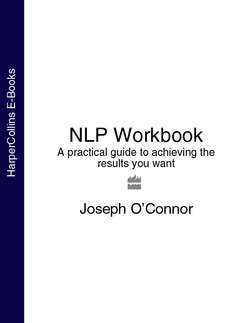Читать книгу NLP Workbook: A practical guide to achieving the results you want - Joseph O’Connor - Страница 26
CHAPTER 4 RELATIONSHIP
Оглавление| How do you relate to others? How do you relate to yourself? If you met yourself at a party, would you want to strike up a conversation? |
We create our relationships by what we do and how we think. To be influential in any relationship we need rapport. Rapport is the quality of a relationship of mutual influence and respect between people. It is not an all-or-nothing quality that you have or not – there are degrees of rapport. A person does not have rapport until they build a good relationship with another person, so both have rapport. Rapport is natural. We do not need to create it as much as to stop doing what could be preventing it. NLP supplies the skills to build a respectful and mutually influential relationship by establishing and building rapport on different neurological levels.
Rapport is not manipulation. People who manipulate may look as if they are building rapport, but because they are not letting themselves be open to influence and because they do not respect other people, there is no rapport in their relationships. To be influential, we have to be willing to be influenced, so when we build rapport with another person, we are also willing to be influenced by them.
Rapport is not the same as friendship. Being in rapport is usually enjoyable, but you can have rapport and mutual respect and still not get on personally.
Rapport is not agreement, nor does it necessarily come from agreement. It is possible to agree with someone and not have rapport. It is also possible to disagree with them and be in rapport. Rapport can be built quickly and can also be lost quickly. The more quickly it is built, the more quickly it can be lost.
Rapport comes from taking a second position. When we take second position, we are willing to try to understand the other person from their point of view. In the process we may realize that if we knew what they know, had experienced what they have experienced and wanted what they want, then we would probably be acting as they are acting, even though from our perspective (first position), their behaviour may seem strange. This does not justify their behaviour, but it does make it understandable.
Satisfying relationships are built by rapport, not agreement.
How do you build rapport?
By taking a genuine interest in another person.
By being curious about who they are and how they think.
By being willing to see the world from their point of view.
| RAPPORT AND TRUST |
Trust is an abstract concept, but without it we could not live together, do business together or feel safe. Like rapport, trust is built in a relationship, however it is possible for you to trust someone without them trusting you in return. It is like a gift you bestow on another.
Again, like rapport, trust is not something you either have or do not have. There are degrees. Trust comes from the Old Norse word traustr, meaning ‘strong’. The same root gives the word ‘true’. We trust when we believe someone will be strong – that is, they do not let us down, we can ‘lean on’ them – and we trust what we believe to be true. Other people trust us when they believe we are strong and will not let them down. A relationship of mutual trust can only happen between two strong people. While rapport can be built immediately, trust takes time. We need to test the strength of the other person, gradually giving them more to see what happens. A relationship based on mutual trust is one of the most satisfying relationships possible.
While rapport is an investment, trust is a risk and a delicate dance with another person that takes time to manifest. How much do you have to know a person in order to trust them? Will they let you down? How strong are they?
We usually judge by hindsight. If someone lets us down, we may blame ourselves and not take that risk again or we may blame the other person for not meeting our expectations.
People have different thresholds for trust. Too low a threshold and you will trust too easily and may be let down often. Too high a threshold and you want another person to give too much before committing yourself. Few people will qualify for your trust and this can be emotionally isolating.
One of the hardest choices about personal relationships is whom to trust, how you decide to trust and how vulnerable you are prepared to be in order to trust.
| PACING AND LEADING |
To build rapport and good relationships, you have to begin by pacing another person. Pacing is when you enter the other person’s model of the world on their terms. It is exactly like walking beside them at the same pace. Too fast and they have to hurry to keep up with you, too slow and they have to hold themselves back. In either case, they have to make a special effort.
Once you have paced another person, established rapport and shown that you understand where they are coming from, then you have a chance to lead them. Leading is when you use the influence that you have built up from pacing. You cannot lead a person unless they are willing to be led and people are not willing to be led unless they have first been adequately paced.
To extend the metaphor, once you have walked at someone’s pace so that they are comfortable, you can change your pace to one that suits you better and they will be more likely to follow your lead.
